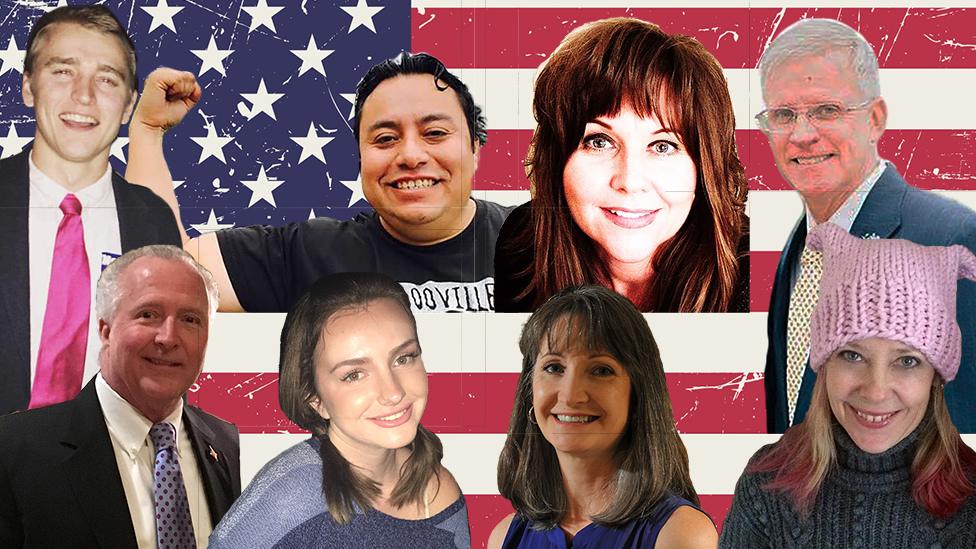Has Trump kept his campaign promises?
- Published
Donald Trump: First 100 days in 100 of his own words
Determining a presidency's success by inspecting its "first hundred days" is a bit of an artificial construct. If humans were born with 12 fingers, then perhaps we'd be evaluating presidents based on their first 144 days instead. If the Earth rotated a bit more slowly, then presidents would have more time to notch accomplishments.
Then again, 100 days is plenty of time to get a rough handle on the shape and thrust of a presidency - and to evaluate what kind of progress a leader has made toward fulfilling campaign promises.
The first 100 days of Donald Trump's presidency have been anything but boring or slow, but how much of it was sound and fury and how much entailed real action?
Here's a quick review of some of the peaks and valleys.

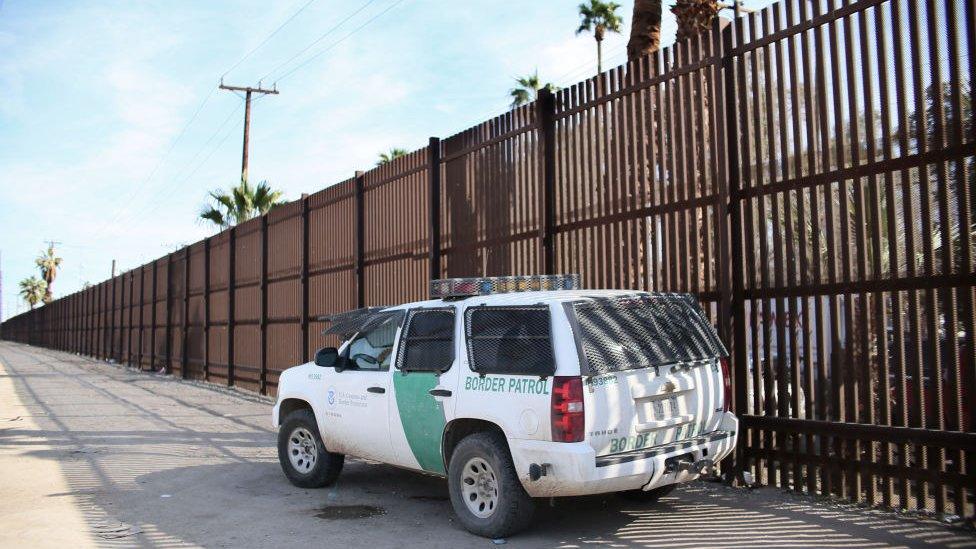
The wall
Let's start with the wall - not the president's only promise, but certainly one of his oldest, most high-profile ones. Candidate Trump constantly spoke of the great wall that he plans to build along the US-Mexico border at his campaign rallies, and the crowd roared in agreement when he said Mexico would pay for the project.
Contrast that certainty with this tweet, which the president wrote over the weekend.
"Eventually, but at a later date so we can get started early, Mexico will be paying, in some form, for the badly needed border wall," he tweeted, external.
It's a case of Trump promises meeting political realities, in 140 characters or less. Campaign rhetoric is easy; turning talk into action in Washington is much more complicated.
The administration has pledged to reshuffle some moneys to begin wall construction, but it is increasingly clear that Congress will need to find billions of dollars to make the wall a reality. That sets up a showdown between the president and legislators, with many Republicans - particularly those representing areas along the US-Mexico border - not keen on opening up the federal purse for Mr Trump's pet project.
Promise kept? Nope.

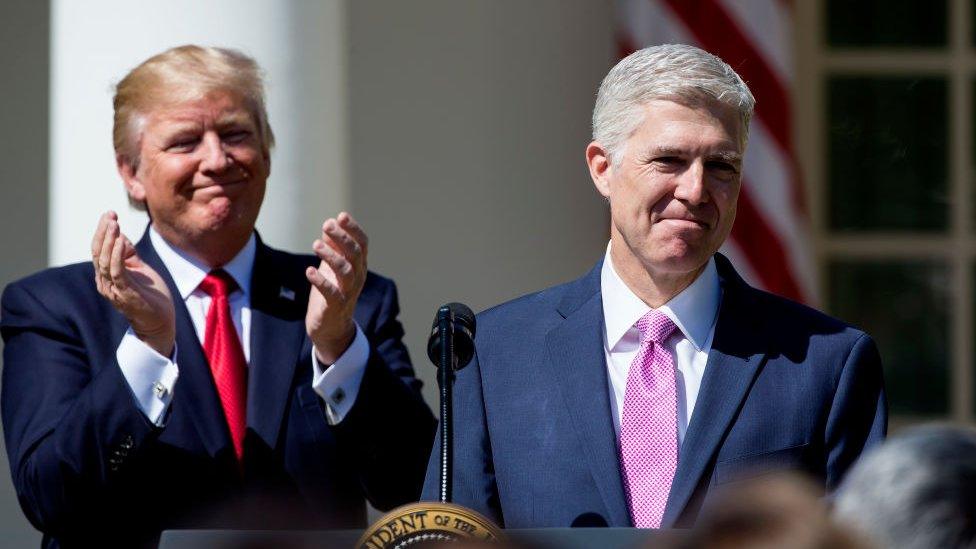
Supreme Court
Mr Trump promised to choose a Supreme Court justice to fill the empty seat on the bench from a list he released during the presidential campaign - and, by tapping Neil Gorsuch, he did.
"I've always heard that the most important thing that a president of the United States does is appoint people - hopefully great people like this appointment - to the United States Supreme Court," Mr Trump said at Mr Gorsuch's White House swearing-in ceremony. "And I can say this is a great honour. And I got it done in the first 100 days. That's even nice. You think that's easy?"
That kind of depends how one defines "easy". Mr Gorsuch's confirmation hearing was bruising, no doubt. Facing united Democratic opposition, Republican Senate leader Mitch McConnell broke with longstanding precedent to allow a simple majority vote for Supreme Court confirmations. Once that was done, however, it was simply a matter of the Republican majority in the Senate imposing its will.
While Mr Trump may have only had to put a name on a piece of paper and rely on Senate Republicans to do the heavy lifting, he did tick a major item of his presidential to-do list. He satisfied a Republican base that stuck with him through a tumultuous campaign on the understanding that they'd get just such a reliable conservative on the court.
They may continue to stand by this president in the hope there will be more nominees like Mr Gorsuch to come.
Promise kept? Definitely.

Healthcare
"Nobody knew healthcare could be so complicated."
It's way too early for political epitaphs, but if the Trump presidency collapses under the weight of disorganisation and broken promises, this February quote from the president - made as it became increasingly clear his own party couldn't even agree on healthcare reform - will make a fitting inscription for a tombstone.
At one point during the presidential campaign, Mr Trump promised that the Democratic healthcare reform legislation - Obamacare, as it has become known - would be repealed on his first day in office.
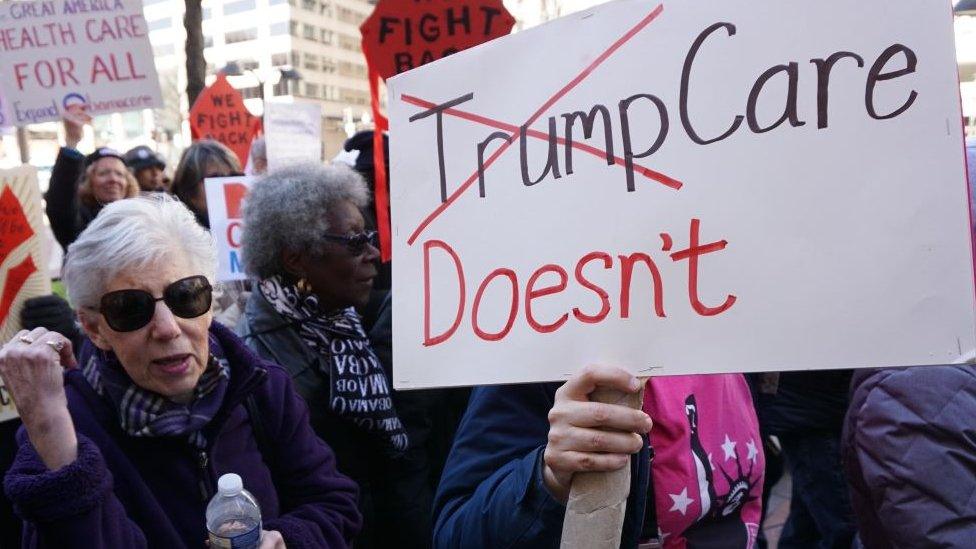
Then, after the first Republican legislative effort crashed and burned in late March - 64 days into his presidency - Mr Trump backtracked on his timeline.
"I never said repeal it and replace it within 64 days," he said. "I have a long time. But I want to have a great healthcare bill and plan, and we will. It will happen. And it won't be in the very distant future."
Since then there's been speculation that a new deal could be in the works - but such rumours have evaporated upon closer scrutiny.
There's no telling what the future may bring, but the reality at this point is that healthcare reform was Mr Trump's first major legislative push - the de facto focus of his first 100 days in office - and it has done nothing but expose the Republican Party as fractured body incapable of advancing a coherent agenda.
Promise kept? Uh, no. Definitely not.

Immigration
Mr Trump may have a bit of a mixed record when it comes to fulfilling his promises on immigration, but it's not for a lack of trying. His administration has taken two shots at curtailing the US refugee programme and preventing citizens of a handful of majority Muslim nations from entering the US, but those executive actions have been stymied by a handful of court judges (one, as Attorney General Jeff Sessions put it, residing on an "island in the Pacific").

Mr Trump has also stepped up immigration enforcement across the US, threatened "sanctuary cities" that don't co-operate fully with federal immigration officials, ordered a review of immigration programmes, including H-1B visas given to high-skilled immigrants, and announced a hiring spree on border patrol agents and immigration court judges.
Immigration arrests were up 32.6% in the first month and a half of the Trump presidency, according to, external the Washington Post, with a larger share coming from those without a prior criminal record. Meanwhile, border apprehensions have dropped.
Throughout the campaign the president talked tough on immigration - even though the number of undocumented migrants entering the US had been declining over recent years. Given that the law grants the president sweeping authority over immigration policy, Mr Trump is clearly following his words with actions.
Promise kept? Yes - despite the effort of "so-called judges" on the mainland and in Hawaii.

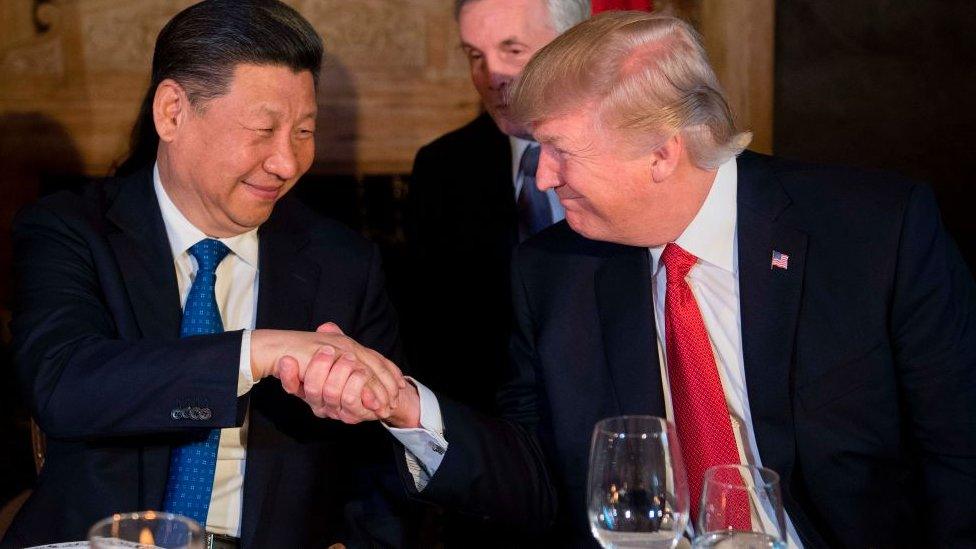
Foreign policy
During the campaign, Mr Trump's foreign policy vision was a collection of sometimes contradictory, often controversial proposals.
The candidate spoke of getting tough on the so-called Islamic State, Iran and China, reaffirming an alliance with Israel and mending relations with Russia. He entertained the notion of lifting restrictions on the use of torture on detainees and giving the US military more authority to act, including by targeting the families of suspected militants.
Above all else, he promised to put American priorities first and downplayed support for US allies and international alliances that he deemed too burdensome.
As president, the contradictions may have changed in nature but the controversy lingers.
He pulled the US out of the Trans-Pacific Partnership as promised and has begun a review process for the North American Free Trade Agreement.
Torture remains off the table, thanks to the influence of Defence Secretary James Mattis. Mr Trump has occasionally told foreign leaders - Germany's Angela Merkel and Italy's Paolo Gentiloni, for instance - of his expectations that they increase their military spending. On the other hand, he has recently acknowledged the value of Nato membership.
When it comes to China, however, he's taken a softer line. He's backed away from his promise to label the nation a "currency manipulator" or impose steep import tariffs, instead seeking the nation's help in dealing with North Korea.
Then there's Mr Trump's missile strike on Syrian forces following that government's use of chemical weapons on its own people. It's the kind of move that candidate Trump may have dismissed as ineffective - and, in fact, reality TV star Trump had condemned in no uncertain terms in 2013, when Barack Obama proposed his own Syrian intervention.
Promise kept? Yes, no, maybe. Take your pick.

Infrastructure, taxes, childcare…
On 22 October, just a few weeks before election day, Candidate Trump gave a speech in Pennsylvania announcing a "100 Day Plan to Make America Great Again" - a contract, he said, with the American voter.
Included in the accompanying document, external was an outline of a series of official-sounding pieces of legislation he would "work with Congress to introduce" and "fight for" in his first 100 days. They included the Middle Class Tax Relief and Simplification Act, the End the Offshoring Act, the Affordable Childcare and Eldercare Act, the Repeal and Replace Obamacare Act, and the American Energy and Infrastructure Act.
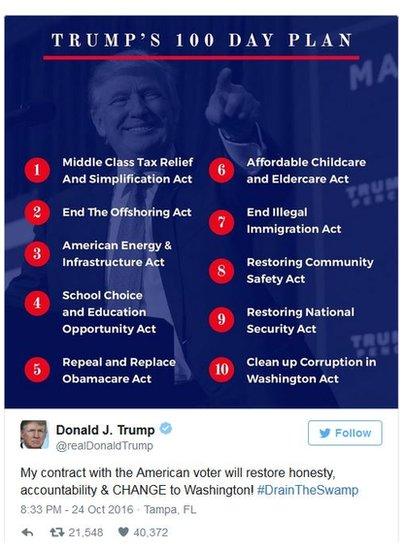
Aside from the aforementioned Obamacare repeal effort, which is currently a smoking crater somewhere on the floor of the House of Representatives, the rest of these pieces of legislation remain in the realm of unicorns and fairies. Mr Trump has said details of a tax plan are coming as soon as this week, but - as we saw with healthcare - a detailed plan creates a juicy target for opponents of all political stripes.
The president signed a raft of executive actions - rolling back Obama-era regulations, authorising the construction of the Keystone XL pipeline and instituting a federal hiring freeze (which has since been lifted) - but in the vast scheme of things those are low-hanging fruit for a new president.
The White House has also boasted that Mr Trump has signed more laws at this point than any president since Harry Truman - but that list includes measures naming Veterans' medical clinics, making appointment to museum boards and creating a memorial to the 1991 Gulf War. Many of the remaining laws rolled back Obama-era regulations, most of which had yet to go into effect.

Legislation that can last beyond any one president is a heavier lift, and Mr Trump has yet to show he has any real muscle.
Promise kept? Consult your nearest unicorn.

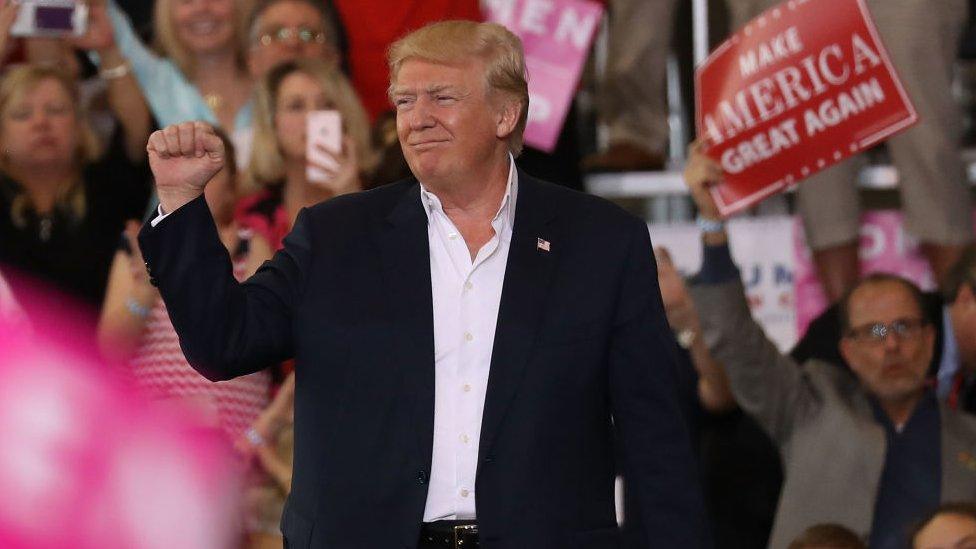
A change of tone
Mr Trump is far from a traditional president, so perhaps it's unfair to evaluate the first few months of his presidency in traditional ways, such as by tallying up his policy accomplishments and failures. His voters largely didn't back his candidacy based on specific promises - on the wall, on healthcare, on taxes - but because of his attitude and his promise to shake up the political system.
If the performance metric is how much the Trump presidency has disrupted politics as usual, Mr Trump has posted a clear victory.
He continues to dominate the national conversation with his controversial tweets and off-the cuff statements, and his actions have defied traditional political norms and standards, whether it's his apparent steadfast refusal to fill lower-level political appointments or observe precedents on open-government practices. He's lectured foreign leaders, browbeat major companies and taken a poleaxe to disfavoured media (while still giving them choice interviews when it serves his purposes, of course).
Mr Trump campaigned on draining the swamp, and he's taken some executive actions to limit administration officials from becoming lobbyists after they leave government service. On the other hand, his promises to avoid conflicts of interest over his wide-ranging business empire have proven vague and unenforceable and he's stocked his administration with the kind of financial insiders and Wall Street bigwigs he regularly railed against on the campaign trail.
So far, however, his dedicated supporters - the ones who powered him to a narrow electoral victory if not a popular vote plurality - seem pleased as punch. According to a recent poll, external, 96% of Mr Trump's voters in November stand by their support of the man. They've apparently seen enough action to convince them that the president is doing what he said he'd do, even if it hasn't yet translated into legislative accomplishments.
If the economy is humming and unemployment stays low, they'll probably remain in his corner for the long haul. For them, the apparent chaos in the nation's capital is a feature, not a bug.
Promise kept? Bigly.
- Published28 January 2019
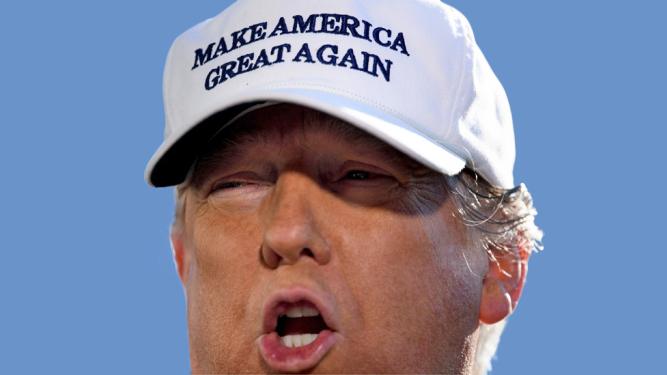
- Published24 April 2017
